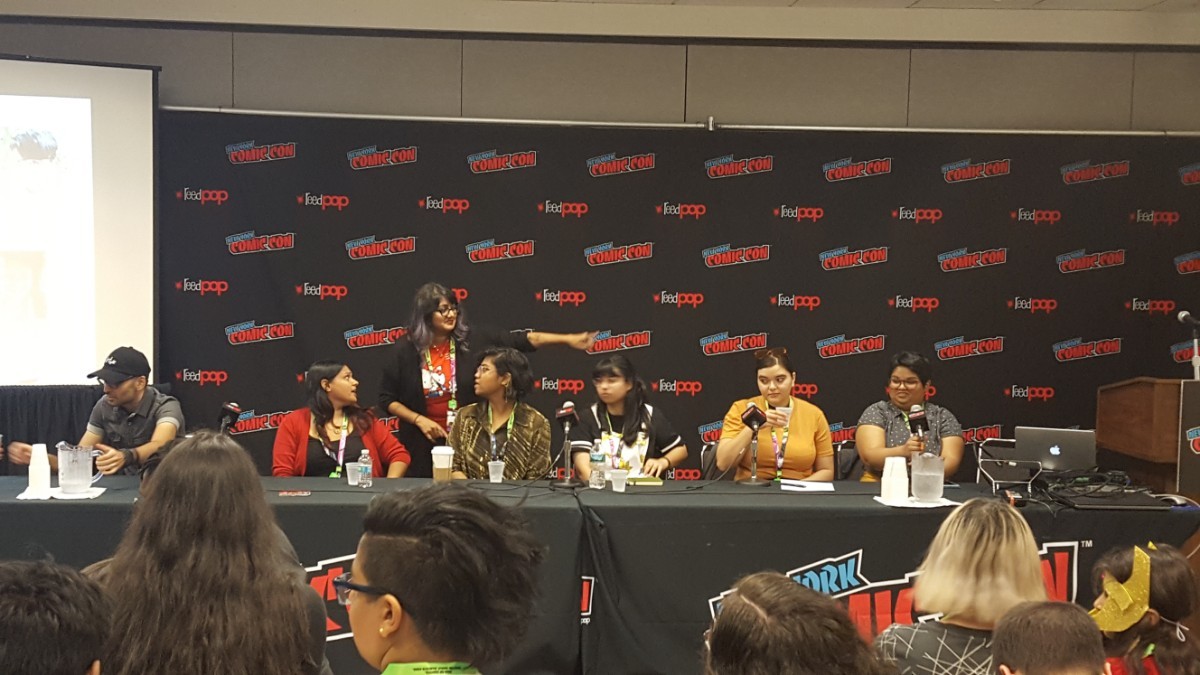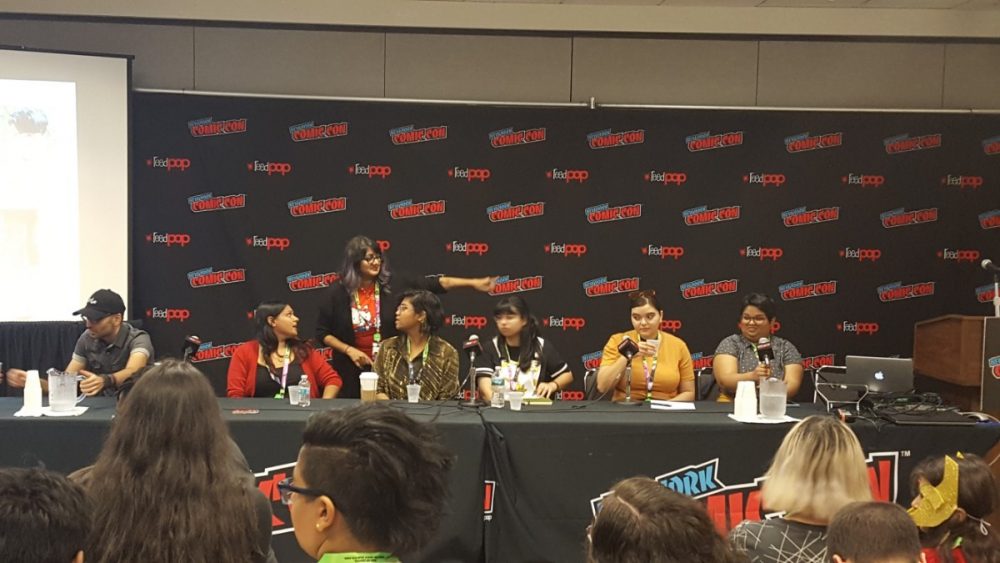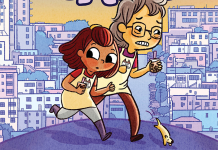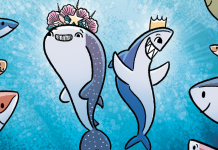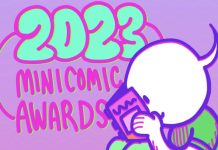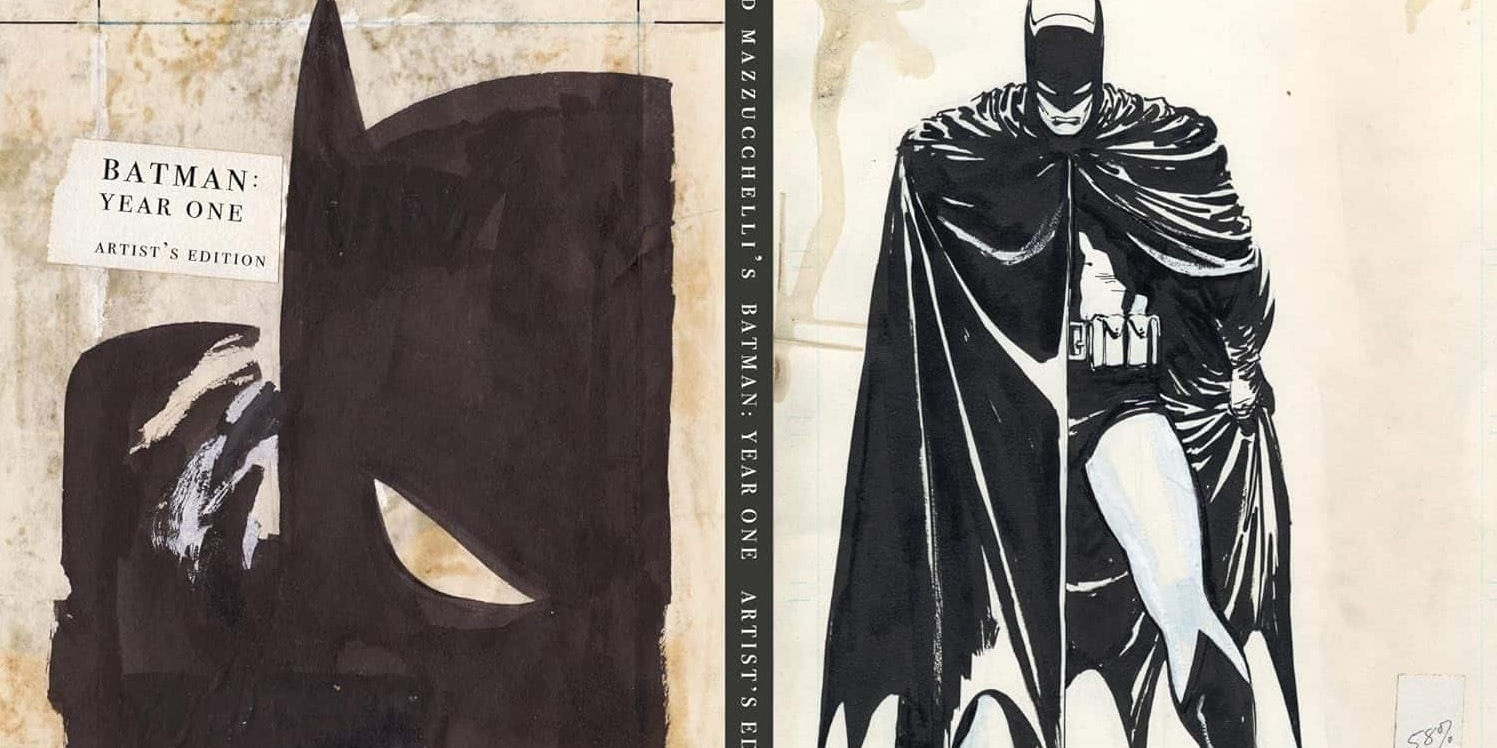By Sara L. Jewell
On Thursday afternoon at the Javitz Center, attendees lined up to hear from a preeminent panel of South Asian creators working in comics. Moderated by Preeti Chhibber of the Desi Geek Girls podcast, panellists Shivana Sookdeo (Elements: Fire), Fahmida Azim (Emanata), Priya Huq (Mana), Ananth Hirsh (Johnny Wander), Veronica Agarwal (Elements: Fire) and Nidhi Chanani (Pashmina) frankly discussed their approaches to creating honest and authentic representations of culture and identity in a visual medium, as well as the barriers they’ve faced – from family all the way to structural bias.
The discussion began with a broad question about how South Asian cultural identity comes into play for each of the creators when they’re making work. Sookdeo, who grew up in New England, said that for a long time she thought of herself as a New Englander first. However, Sookdeo said “My identity is very personal and I don’t like it being questioned… it’s a conversation I’m having with myself. Whether it shows up in my work is my decision.”
Huq corroborated this while also maintaining that her identity showing up in her work is unavoidable when she’s doing autobiographical work. Agarwal talked about struggling with dual cultural identities and the idea of worrying about being “Indian enough”. Azim finds the platitude “juggling two different worlds” reductive: “My experiences aren’t half-anything” she said. Hirsh remarked that it’s only later in his life, more recently for him, that he’s felt comfortable claiming a cultural identity for his work; “There are a lot of people who try to tell you what your identity is” he said, referring to both Indian-Americans and White Americans. Chanani, who identifies strongly with being Indian-American, sees her book Pashmina as a reflection of that identity. “I’m creating for a little girl who didn’t see herself in any books, any greeting cards, any art… but I don’t want to be pigeonholed,” Chanani said.
This idea was a common theme throughout the panel. Most of the panelists spoke on feeling frustrated with both the lack of South Asian representation (as characters in media and as creators of that media) and with the fear of being pigeonholed or taking on the enormous and unrealistic expectation to represent your entire culture, to depict a universal Indian-American experience.
Huq said that “I worry a lot about being a monolith” when creating, because of the lack of representation. Sookdeo asserted that South Asian creators also “don’t have the luxury of not being aware…of decoupling ourselves [from cultural associations]”. She brought up the importance for herself of prioritizing the wellbeing of marginalized creators over and above their work, and maintained that when working on her own stories “I can’t be every Indian person, and I don’t want to be.” Azim felt similarly. “I resent being a spokesperson for a billion people,” she said “because there are so few of us, things that we do get magnified,” something that people who are better represented never have to think about or consider.
Chanani had a slightly different perspective; “I like to think of it as powerful” she said, about including what she called “culture tags”, which she hopes will spark curiosity and engender empathy, “when I think of it as a burden, then I don’t want to do the work”. Chanani views that power specifically as the power to “help folks be seen.” Hirsh also acknowledged this as powerful. He recalled reading an interview after his second book in which someone talked about “erasing themselves” in their own work, and how it caused him to commit himself to including Indian characters in his own comics.
Here, there was an emotional moment between Huq and Hirsh: Huq told Hirsh that while she was coming up as a creator, reading Johnny Wander, that she cried upon finding out that he and collaborator Yuko Ota were “like me.” The emotion in the room during this exchange was palpable.
The panel then moved to considering advice that the panelists would impart to marginalized creators facing the unique frustrations and barriers that the panelists were bringing up, especially when those barriers came from within their own families and communities. Azim shared that her parents would consider no other career for her other than doctor, even though she hates the sight of blood. Huq recounted the distance between herself and her family as a gulf of perspective “art was never an option, because it’s self-indulgent” she said of her parent’s view. She reflected on the possibility of there being resentment from parents who made great sacrifices to live in America, and expect their children to do the same by prioritizing their own financial security.
Several panelists commiserated over parents who were cautiously accepting of an artistic career path once it became viable, but who still wanted their child to be “the best” at what they were doing. Azim went on to reflect on the irony of parents wanting to preserve and perpetuate their culture, but then pushing their young people exclusively into STEM; “My parents are so paranoid about losing the culture, but they refuse to make artists!” she said. Chanani in turn remarked on the emphasis placed on stability and security as also relating to the lack of a straightforward career path in the arts as opposed to other fields. Hirsh said it was a “war of attrition” with his own parents, who also wanted him to go into STEM and “very much knew what they wanted for me”.
For a while, he said, he made comics while pursuing a graphic design degree, and his advice to up-and-comers is that at the very least, you can make art on the side. Azim told an anecdote about a friend who is a NASA scientist whose mother still tells him that he needs to get a real job, because she doesn’t understand what he does, to uproarious laughter from the audience. Sookdeo imparted some heartening advice in her closing words of encouragement: “have incredible, bloody-minded satisfaction in being the first one – be almost spitefully happy [to do what you want to do]” and be a little bit selfish. “I was a psych major first!” she proclaims, and several other panellists shout out their early forays into STEM fields like biochemistry and pre-med, to more laughter.
”It’s not your job to suffer. Valuing yourself is the most important thing… complete infatuation with yourself and your work… and have a little bit of an ego” Sookdeo said.


